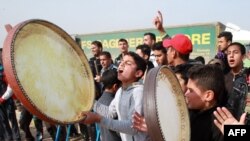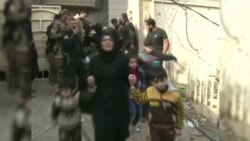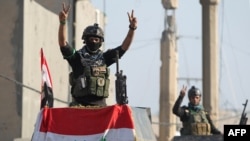Death is all they saw, said one of the men who survived life under Islamic State rule in Ramadi.
Helped by Iraqi forces, he and some 50 families were shepherded out of the city Wednesday, fleeing the fighting with little other than the clothes they were wearing.
“When the security was gone from Anbar province, life was dead. Even if they tell you that we were living, this is not true,” the man said, not giving his name. “Death is all we saw. Bloody people came upon us, people that don't know the meaning of humanity. God bless you for rescuing us.”
WATCH: Iraqi Forces Rescue Civilians Trapped by IS Extremists in Ramadi
The U.N. refugee agency, nongovernmental organizations and Iraqi authorities are rushing to meet the refugees’ immediate needs: food, water and shelter from wintertime cold.
“What we hear from new arrivals is that indeed it has been difficult for them to get out. There has been sniper fire; there have been protection concerns,” Grainne O’Hara of UNHCR told VOA via Skype from Baghdad.
Dire straits
“Just put yourself in the shoes of these people,” O’Hara said. “Most of them are fleeing now under quite difficult circumstances, and are leaving essentially with the clothes they have on their backs, and whatever small personal belongings they can manage to carry.”
According to the humanitarian organization, areas of the city are still insecure and littered with bombs. The extensive fighting and airstrikes to recapture the city left extensive damage to buildings and houses, as well as power and water supplies.
O’Hara said UNHCR’s partners in the area were reporting that the refugees appeared traumatized.
Iraqi security forces fighting for control of the city said Islamic State extremists had been using the civilians as human shields.
“We’ve freed more than 52 families who were used as human shields by the gangs of Daesh, and we gave them first aid and food. We thank God we freed them, and now we are transferring them to secure locations,” said the Iraqi Counterterrorism Unit’s Major Salam Hussein, using an Arabic acronym for IS.
At a briefing in Baghdad on Wednesday, a coalition intelligence official said some 700 Islamic State fighters were still holed up in the center of the city and on its eastern outskirts, Reuters reported.
Joining other refugees
The latest displaced families will be joining thousands of earlier refugees from Ramadi, even though living conditions for them are far from ideal. The UNHCR said that in one former hotel, more than 300 displaced families have been living for months, often without running water, heat or electricity.
Most of the refugees from the violence in Ramadi are in a series of camps west of Baghdad.
Iraqi authorities have restricted their entry into the capital by requiring them to have guarantors. According to Human Rights Watch, the restrictions in practice discriminate against Sunni Arabs.
Ramadi, the capital of Anbar province, is largely Sunni. Islamic State militants have drawn heavily on alienated Sunnis for support, but many Sunnis say they have been trapped between IS brutality and death threats from the government-backed Shi'ite militias.
The government has said the restrictions are in place to protect the capital from IS fighters infiltrating the city under the guise of being refugees.








